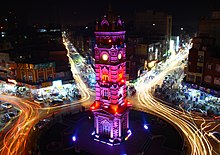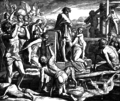Portal:Cities
The Cities Portal

A city is a human settlement of a notable size. The term "city" has different meanings around the world and in some places the settlement can be very small. Even where the term is limited to larger settlements, there is no universally agreed definition of the lower boundary for their size. In a more narrow sense, a city can be defined as a permanent and densely settled place with administratively defined boundaries whose members work primarily on non-agricultural tasks. Cities generally have extensive systems for housing, transportation, sanitation, utilities, land use, production of goods, and communication. Their density facilitates interaction between people, government organizations, and businesses, sometimes benefiting different parties in the process, such as improving the efficiency of goods and service distribution.
Historically, city dwellers have been a small proportion of humanity overall, but following two centuries of unprecedented and rapid urbanization, more than half of the world population now lives in cities, which has had profound consequences for global sustainability. Present-day cities usually form the core of larger metropolitan areas and urban areas—creating numerous commuters traveling toward city centres for employment, entertainment, and education. However, in a world of intensifying globalization, all cities are to varying degrees also connected globally beyond these regions. This increased influence means that cities also have significant influences on global issues, such as sustainable development, climate change, and global health. Because of these major influences on global issues, the international community has prioritized investment in sustainable cities through Sustainable Development Goal 11. Due to the efficiency of transportation and the smaller land consumption, dense cities hold the potential to have a smaller ecological footprint per inhabitant than more sparsely populated areas. Therefore, compact cities are often referred to as a crucial element in fighting climate change. However, this concentration can also have significant negative consequences, such as forming urban heat islands, concentrating pollution, and stressing water supplies and other resources. (Full article...)
Selected city -

Aden (Arabic: عَدَنْ, romanized: ʿAdan, Old South Arabian: 𐩲𐩵𐩬) is a port city located in Yemen in the southern part of the Arabian peninsula, positioned near the eastern approach to the Red Sea. It is situated approximately 170 km (110 mi) east of the Bab-el-Mandeb strait and north of the Gulf of Aden. With its strategic location on the coastline, Aden serves as a gateway between the Red Sea and the Arabian Sea, making it a crucial maritime hub connecting Africa, Asia, and the Middle East. As of 2023, Aden City has a population of approximately 1,080,000 residents, making it one of the largest cities in Yemen.
The city, with its rich trade history, embraces a vibrant blend of Arabic, Indian, and African influences. Positioned near the Bab Al-Mandab Strait, a vital maritime route, it serves as a crucial seaport. The city boasts key infrastructure like Aden International Airport and notable healthcare institutions including Aljoumhouria Teaching Hospital (Queen Elizabeth II), Aden General Hospital, and Friendship Teaching Hospital. Aden is divided into eight districts: Tawahi, Mualla, Crater, Khur Maksar, Al Mansura, Dar Sad, Sheikh Othman, and Al Buraiqa. These form today's Aden Governorate. During British Colonialism, Aden referred to the area along the north coast of the Gulf of Aden, encompassing Tawahi, Mualla, Crater, and much of Khur Maksar District. The western harbor peninsula, known as Little Aden, now falls within the Al Buraiqa District. (Full article...)Did you know -
- ... that a New York City office building was nicknamed for its resemblance to a lipstick tube?
- ... that before Foster City was built on Brewer Island, unsuccessful proposals included a hog farm, two military air bases, two civilian airports, and an entertainment complex larger than Disneyland?
- ... that the heiress Gertrude Rhinelander Waldo abandoned a brand-new mansion in New York City and refused to sell, rent, or maintain it?
- ... that City Pier A's clock tower was the first memorial to World War I casualties in the United States, according to a New York City government spokesperson?
- ... that entrepreneur Ian Schrager paid a record $9 million for two apartments at the Majestic in New York City, but he never lived there?
- ... that the last five minutes of a 1977 game between Coventry City and Bristol City were played with neither team attempting to score?
Related portals
Related WikiProjects

Faisalabad ( /fɑːɪsɑːlˌbɑːd/; Punjabi, Urdu: فیصل آباد, Punjabi pronunciation: [fɛːsə̆ləˌbäːd]; Urdu pronunciation: [fɛːsˈlɑˌbɑːd] ⓘ), formerly known as Lyallpur (Punjabi, Urdu: لائل پور), is the second largest city and industrial centre of the Pakistani province of Punjab. It is a metropolitan city of Pakistan and the third largest and populous city in Pakistan, with an estimated population of 3.7 million in 2023 with the growth rate of 2.37%. It is situated in the north-east of the country, lying between the plains of the Ravi and Chenab River. Faisalabad is one of Pakistan's wealthiest and most industrialized city, the largest industrial hub and second largest city of the wider Punjab region.
Historically one of the largest villages of Punjab, Lyallpur was one of the first planned cities within British India, it has long since developed into a cosmopolitan metropolis. Faisalabad was restructured into city district status; a devolution promulgated by the 2001 local government ordinance (LGO). The total area of Faisalabad District is 5,856 km2 (2,261 sq mi) while the area controlled by the Faisalabad Development Authority (FDA) is 1,326 km2 (512 sq mi). (Full article...)Selected article -

The George Floyd protests were a series of demonstrations against police brutality and riots that began in Minneapolis in the United States on May 26, 2020. The protests and civil unrest began in Minneapolis as reactions to the murder of George Floyd, a 46-year-old unarmed African American man, by city police during an arrest. They spread nationally and internationally. Veteran officer Derek Chauvin was recorded as kneeling on Floyd's neck for 9 minutes and 29 seconds; Floyd complained of not being able to breathe, but three other officers looked on and prevented passers-by from intervening. Chauvin and the other three officers involved were later arrested. In April 2021, Chauvin was found guilty of second-degree murder, third-degree murder, and second-degree manslaughter. In June 2021, Chauvin was sentenced to 22+1⁄2 years in prison.
The George Floyd protest movement began hours after his murder as bystander video and word of mouth began to spread. Protests first emerged at the East 38th and Chicago Avenue street intersection in Minneapolis, the location of Floyd's arrest and murder, and other sites in the Minneapolis–Saint Paul metropolitan area of Minnesota. Protests quickly spread nationwide and to over 2,000 cities and towns in over 60 countries in support of the Black Lives Matter (BLM) movement. Polls in the summer of 2020 estimated that between 15 million and 26 million people had participated at some point in the demonstrations in the United States, making the protests the largest in U.S. history. (Full article...)General images -
Topics
List articles
Subcategories
Associated Wikimedia
The following Wikimedia Foundation sister projects provide more on this subject:
-
Commons
Free media repository -
Wikibooks
Free textbooks and manuals -
Wikidata
Free knowledge base -
Wikinews
Free-content news -
Wikiquote
Collection of quotations -
Wikisource
Free-content library -
Wikiversity
Free learning tools -
Wiktionary
Dictionary and thesaurus







































